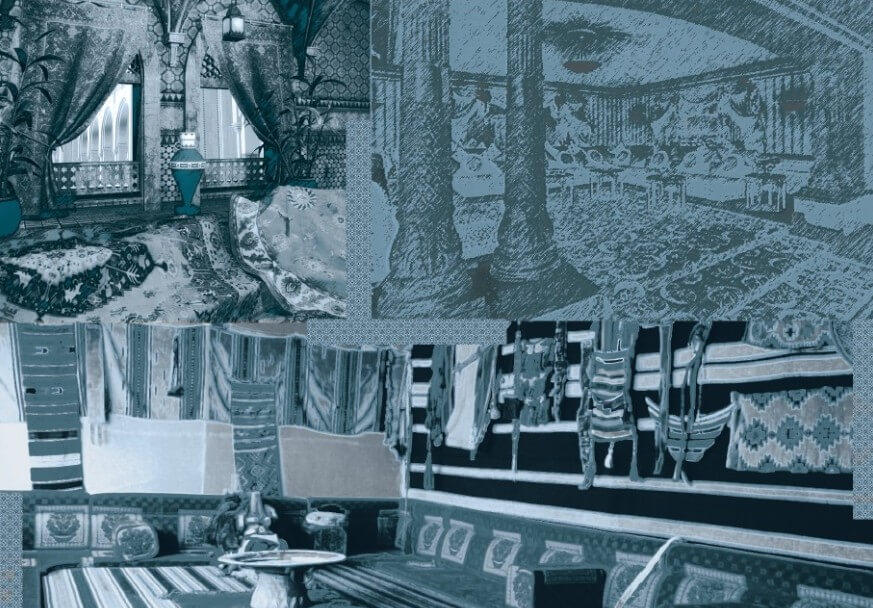Adorned with an abundance of cushions and carpets, smelling of coffee and oud, the majlis constitutes an integral part of the lives of Middle Eastern people. The concept of the majlis, an area of sitting and gathering, is shared by many families across the region. It may be practiced in different ways and following different traditions, however, in essence it remains a ritual with ancient roots containing key functions such as to foster the sense of community, to offer a platform for opportunities and exchange, and to create a place that generates solidarity and friendship amongst its visitors. Business families have used the majlis as a strategic entity for a long time to strengthen family ties and to communicate with the community in open channels.
Majlis takes place in the evening in a special room or annex which is usually separate from the rest of host house.
Origin and function
The word Majlis, as popularly known, shares its root with the verb ‘jlis’ in Arabic, meaning ‘to sit’. Directly translated it means a place of sitting, which describes its rudimentary function. The majlis can be hosted by an individual, a family, or an interest group and the concept can be traced back to the days of Prophet Mohammed (PBUH) and beyond. During the Prophet’s lifetime, he regularly consulted an inner circle of friends and advisers. In the centuries that followed Prophet Mohammed’s (PBUH) life, and with Arab culture spreading its influence far and wide, majlises became a common tradition throughout the Muslim world, often replacing other forms of gathering. The concept also entered the world of politics, and resulted in the word ‘majlis’ today being used for ‘parliaments’ in various Arab and Muslim countries.
Majilises in the GCC
In the GCC countries, the cradle of today’s majlises, the age-old tradition holds great significance for different social groups. It is very much oriented towards family and friendly gatherings, however, is also known to have a great importance for business. Indeed, many of the various issues discussed in majlises are crucial and some famous businessmen in the region have set up gatherings explicitly to foster the dialogue between citizens and the business community.
The function of a majlis may differ from host to host, and from country to country. Some majlises are purely social; others are networking powerhouses, and can hold great opportunities for exchange and information.
Kuwait: The Dewaniya
Kuwait knows its own form of majlis – the dewaniya. The dewanyia’s crucial role in the development of Kuwait over the last 250 years cannot be underestimated, as it was a forum that facilitated quick communication amongst decision makers and enabled them to reach consensus with more ease.
There are many types of dewaniya’s that have evolved from the original archetype and they differ slightly in their form and whether they are public, private or only for the family. Family dewaniya’s were the original form, with families building an extension to their main home to host guests and lead important discussions. Similarly to the majlis, the seating arrangement is u-shaped and the elders and main guests sit at the head of the room.
The family business and the majlis
Especially in the Gulf countries, where majlises are a crucial part of social life, family businesses have always used them as important platforms.
Business families are very much embedded in their immediate social environment, which is why it is crucial for them to know their community and interact with their stakeholders. During a public majlis, families can learn how their company is perceived by their customers, get insight into the concerns of the community and at the same time communicate the values of the family and business.
On the other hand, majlises are important forums for the family itself and can function as family assemblies, where discussions about the general state of business, governance or family issues can be held. It can be a great asset to have this type of informal gatherings, as it allows each member of the family to voice their opinion and can foster innovation through exchange.
Finally, the majlis is a crucial instrument in including the young generation into the business. By allowing youngsters to interact with the family’s elders, listen to their stories about the family and about how the business was built as well as involving them in business discussions from an early age, is a good opportunity. Young people will automatically feel a sense of belonging and both, family and business, will become a part of their identity.
Tharawat Magazine, Issue 9, 2011
















